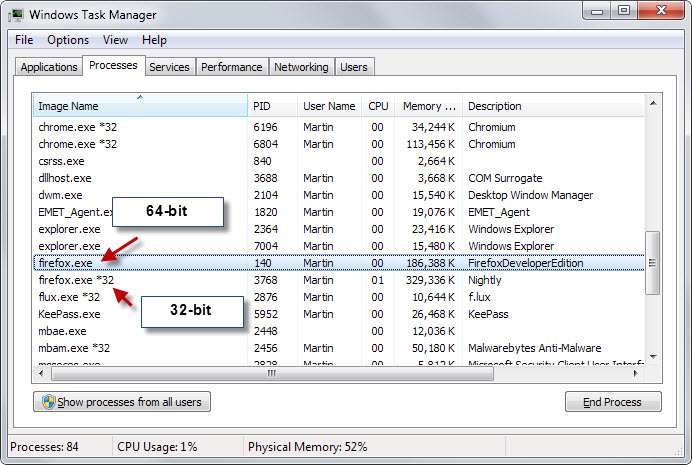Firefox 56: automatic 32-bit to 64-bit upgrade
Mozilla plans to upgrade Firefox 32-bit installations to the 64-bit version of the web browser when it releases Firefox 56 later this year.
While stable 64-bit versions of the browser have been available for Linux and Mac OS X for a long time, the same cannot be said for the Firefox 64-bit version for Windows. While it was offered as 64-bit development versions for those interested, a stable version was not provided for a long time
Mozilla started to release Firefox 64-bit for Windows in December 2015 to the release channel. This was first an optional download that users had to seek out, but has since then been made the default.
The organization revealed in August 2016 how it planned to make Firefox 64-bit on Windows the default for compatible systems, and migrate the 32-bit population on 64-bit architecture to the 64-bit version of the browser.

The plan back then involved integrating the 64-bit version in the Firefox stub installer, making it the default in early 2017 in that installer, and shipping Firefox 64-bit as the default later that year.
Starting with Firefox 55, which has a planned release date of August 8, 2017, 64-bit Firefox will be the default option on Windows. This is only the case however if the Windows device supports 64-bit and has at least 2 Gigabytes of memory.
Migration from 32-bt versions of Firefox to 64-bit on Windows start with the release of Firefox 56. Mozilla plans to release Firefox 56 on September 26, 2017.
Starting with Firefox 56, planned release date is September 26, 2017, Mozilla plans to upgrade Firefox 32-bit installations on 64-bit versions of Windows to 64-bit versions of Mozilla Firefox.
The same limitations -- a minimum of 2 Gigabytes of RAM and at least Windows 7 -- apply to the migration.
The main reason why Mozilla plans to migrate Firefox users on Windows to 64-bit versions is that it decreases the out-of-memory crash rate and improves security. Downside is that 64-bit versions of Firefox use more memory than 32-bit versions of the web browser.
Mozilla published some stats that highlight these improvements and changes:
- About 8% of Windows users run systems with 2 Gigabytes of RAM or less,
- The content process crash rate of 64-bit Firefox installations on Windows with 2GB of RAM is the same as on 32-bit systems on systems, and 20% less on systems with more than 2 Gigabytes of RAM.
- The browser process crash rate of 64-bit Firefox installations on Windows with 2 Gigabytes of RAM is the same as 32-bit versions of the browser, and about 20% less on systems with more than 2 Gigabytes.
- The 64-bit plugin process crash rate is 50% less on 64-bit systems with 2 Gigabytes of RAM, and 80% less on systems with more than 2 Gigabytes of RAM.
Additional information on the migration to 64-bit Firefox on Windows is available on the Mozilla Wiki website.
This article was first seen on ComTek's "TekBits" Technology News

- Log in to post comments